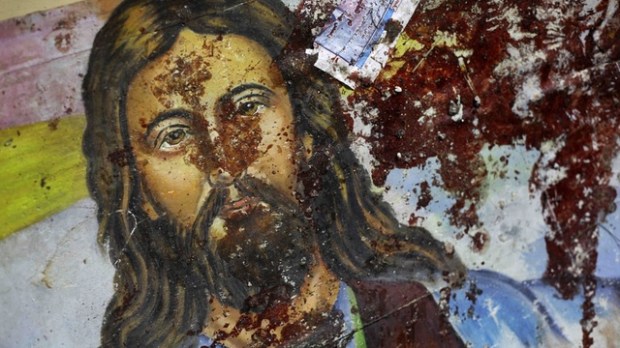VATICAN CITY — Christians must “go where Jesus is not known, where Jesus is persecuted, or where Jesus is disfigured, to proclaim the true Gospel,” Pope Francis said today, on the feast of St. Mark, the Evangelist and father of Christianity in Egypt.
Speaking at morning Mass, four days before he travels to Egypt, the pope said a true preacher of the Gospel “does not seek life insurance policies” and must “go out” humbly to preach the scandal of the Cross.
The pope reflected on St. Mark’s Gospel account of the Great Commission, and said Jesus gave His disciples a mission: to proclaim the Gospel, “to not remain in Jerusalem, but to go out to proclaim the Good News to all.”
“The Gospel is always proclaimed on the road, never sitting down,” he said.
Going where Jesus is persecuted
Christians, the Pope said, need “to go out where Jesus is not known, or where Jesus is persecuted, or where Jesus is disfigured, to proclaim the true Gospel”:
“To go out in order to proclaim. And the preacher risks his life in this going out. He is not safe; there are no life insurance policies for preachers. And if a preacher seeks a life insurance policy, he is not a true preacher of the Gospel: He doesn’t go out, he stays in place, safe. So, first of all: Go, go out.”
Yet, this ‘going out’ does not necessarily mean leaving one’s home, Pope Francis said, as cloistered contemplatives, or the sick show us. For preaching the Gospel first means going out of oneself to be united with the Lord:
“The Gospel, the proclamation of Jesus Christ, goes forth, always; on a journey, always. On a physical journey, on a spiritual journey, on a journey of suffering: we think of the proclamation of the Gospel that leads to so many sick and people – so many sick people! – who offer their sufferings for the Church, for the Christians. But they always go out of themselves.”
What is “the style of this proclamation?” the Pope asked. “St. Peter, who was St. Mark’s teacher, was perfectly clear in his description of this style”: “The Gospel must be announced in humility, because the Son of God humbled Himself, emptied Himself.” This, the Pope said, “is the style of God”; there is no other. “The proclamation of the Gospel,” he said, “is not a carnival, a party.” This is “not the proclamation of the Gospel.”
Humility and vigilance
The Gospel, the Pope said, “cannot be announced with human power, cannot be proclaimed with human power, cannot be proclaimed with the spirit of climbing and advancement. This is not the Gospel.” All of us, then, are called to vest themselves with “humility, one towards another,” because “God resists the proud, but gives grace to the humble”:
“And why is this humility necessary? Precisely because we carry forward a proclamation of humiliation – of glory, but through humiliation. And the proclamation of the Gospel undergoes temptation: the temptation to power, the temptation to pride, the temptation to worldliness, to so many kinds of worldliness that they bring preaching or to speaking; because he does not preach a watered down Gospel, without strength, a Gospel without Christ crucified and risen. And for this reason St. Peter says: ‘Be vigilant, be vigilant, be vigilant… Your enemy the Devil is prowling around like a roaring lion looking for someone to devour. Resist him, steadfast in faith, knowing that your brothers and sisters throughout the world undergo the same sufferings.’ The proclamation of the Gospel, if it is true, undergoes temptation.”
If a Christian says he is proclaiming the Gospel “but is never tempted,” it means that “the devil is not worried,” because “we are preaching something useless,” Pope Francis said.
The Lord remains close to preachers the Cross
Therefore, the Pope continued, “in true preaching there is always some temptation, and also some persecution.” He said that when we are suffering, the Lord is there “to restore us, to give us strength, because that is what Jesus promised when He sent the Apostles”:
“The Lord will be there to comfort us, to give us the strength to go forward, because He works with us if we are faithful to the proclamation of the Gospel, if we go out of ourselves to preach Christ crucified, a scandal and a folly, and if we do this with a style of humility, of true humility. May the Lord grant us this grace, as the baptized, all of us, to take the path of evangelization with humility, with confidence in Him, announcing the true Gospel: ‘The Word is come in the flesh.’ The Word of God is come in the flesh. This is a folly, it is a scandal; but doing it with the understanding that the Lord is at our side, He works with us, and He confirms our work.”

Read more:
Saint Mark: Father of Coptic Christianity

